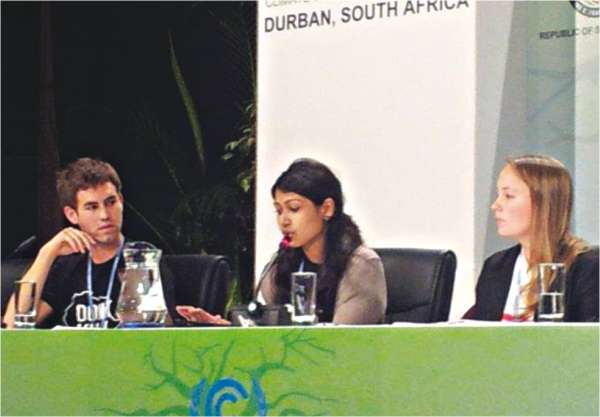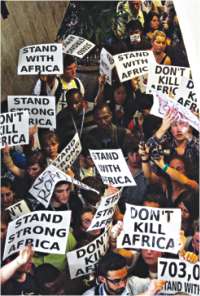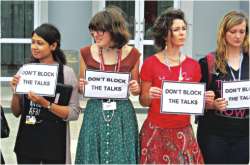| Youth in Action
UNFCCC COP 17:
Durban Climate Change Conference
Armin Zaman Khan
Photos: Armin Zaman Khan
In the biggest climate change conference in Durban, South Africa last year, I represented my organisation CommunityAction as a social volunteer, and my country Bangladesh as a young individual. Bangladesh is one of the countries on the forefront of climate change and one of the countries with the tiniest of voices in the big climate change conferences that decide the fate of millions of people of this country. Only a few youths from my country get the opportunity to experience this decisive event first hand to gain valuable knowledge that would pave the way for them to become negotiators in the future. The decisions made in the Conference of Parties are crucial for the fate of the third world countries, which are directly affected by climate change. Understanding this phenomenon in the context of the entire world is definitely important for the youth to comprehend what necessary steps they should take to make their efforts effective.

Armin Zaman Khan, representing Bangladesh and CommunityAction.
In the two-week long conference, I attended as many events, meetings, and briefings organised by Bangladesh to interact with as many official delegates from my country as possible. This conference gave me the invaluable opportunity to know about my country's standpoint in various policies in the climate change talks, and I also got the chance to have in-depth discussions with the negotiators, and the Minister for Environment regarding some issues, such as the Kyoto Protocol and the Green Climate Fund. I was fortunate to have personal conversations with our Minister of Environment and Forestry, Dr Hasan Mahmud, regarding some of the burning issues concerning Bangladesh in this conference. He expressed his deep concern that this congregation of world leaders might not lead to an effective second commitment period of the Kyoto Protocol, and that, the Green Climate Fund demands more clarity and justification and that funds should be disbursed to the needy developing nations in as transparent a manner as possible.
 |
|
When asked about the perspective of the high level official delegates of Bangladesh to this climate change conference regarding the participation of youth in negotiation processes, he was very positive about building the capacity of the youth in climate policy and dialogues, and asserted that he would be happy to help us in this regard in the future. I received equally positive responses from people like the Secretary of Ministry of Environment and some Members of Parliament as I talked to them about my concerns regarding the participation of youth in this important conference. Such encouragement can act as boosts for the budding climate change activists.
I was present in the conference till the closing speech by the President of COP17. I witnessed the great speech by the lead negotiator of Venezuela, Claudia Salerno, and the highly controversial yet moving speech by the Minister of India. The memory of that day will never fade out of my mind as I got to witness the head-on negotiation and discussion among the leaders of India, China, United States, and European Union as they came together in a circle and held close, low volume talks among themselves. Neither would I forget the abruptness with which the deals were agreed upon by the President of COP17, leaving most people in the room blank and most negotiators clueless about what exactly they were agreeing on. All these made me realise how many loopholes actually exist behind these big talks, and how much responsibility we, as the climate change negotiators of tomorrow, have in order to fix this and propel it forward.
 |
|
The chief reason I wanted to attend this conference was to meet a diverse pool of like-minded youths from different countries, who were just as concerned and vigilant about the issue of climate change as I was. I believe, exchanging ideas and innovations and building a network of people who are in the same path as I am, are more valuable and rewarding than only scrutinisng problems to which there might not exist any solution at all. Together, I believe, we can be stronger and work towards making important negotiations that will offer fruitful solutions for the problems in the future.
(The writer is an undergraduate student Institute of Business Administration (Dhaka University) and a member of CommunityAction.)
|
|
|
